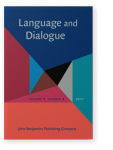The language of Akan herbal drug sellers and advertisers
This paper addresses the language and pragmatic strategies used by Akan herbal drug sellers to persuade would-be-buyers. It adopts the theoretical framework of Weigand’s Mixed Game Model (MGM) and defines persuasion as a variable of competence-in-performance, and language use as the basis of dialogic interaction. It investigates how sellers employ politeness, honorifics, humour, digression, personification, proverbs, metaphors and hyperbole in dialogic action games. The herbal drug sellers are grouped into three: (a) those normally plying on Ghana’s major roads and at bus stations, (b) those who are on radio and TV and (c) those who advertise on radio and TV. We will discuss excerpts of five recordings in the Akan language and translated into English.
Article outline
- 1.Introduction: Persuasive language and advertising
- 1.1Theoretical framework: Herbal drug in the Mixed Game Model
- 1.2The three constitutive principles in the Mixed Game
- 1.3Emotions
- 1.4Individual imprint
- 1.5Socio-cultural imprint
- 2.Persuasion and advertising
- 2.1Adverts as a business mixed dialogic game
- 2.2The Akan people and herbal drug selling
- 2.3Methodology
- 3.Samples of herbal drug selling discourse
- 4.Pragmatic and rhetorical analysis of herbal drug selling language
- a.Hyperbole
- b.Repetition and parallelism
- c.Humour
- d.Indirection and euphemism
- e.Deixis
- f.Honorifics and personification
- g.Group identity
- h.Code-mixing
- 5.Conclusion
- Notes
-
References
References (29)
Agyekum, Kofi
2002 “
Menstruation as a Verbal Taboo among the Akan.”
Journal of Anthropological Research 581: 367–387.


Agyekum, Kofi
2003 “
Honorifics and Status Indexing in Akan Communication.”
Journal of Multilingual and Multicultural Development 24(5): 369–385.


Agyekum, Kofi
2004 “
Aspects of Persuasion in Akan Communication.”
International Journal of Language and Communication RASK 211: 63–96.

Agyekum, Kofi
2005 “
The Pragmatics of Requests in Akan Communication.”
Legon Journal of Humanities 161: 1–26.

Agyekum, Kofi
2010 Akan Verbal Taboos in the Context of the Ethnography of Communication. Accra: Ghana Universities Press.

Agyekum, Kofi
2013 Introduction to Literature. 3rd edition. Accra: Adwinsa Publishers.

Blum-Kulka, Shoshana and Elite Olshtain
1984 “
Requests and Apologies: A Cross-Cultural Study of Speech Act Realization Patterns (CCSARP)”.
Applied Linguistics 5(3): 196–123.


Bolatito, Ojenike
2012 “
Linkage between Persuasion Principles and advertising.”
New Media and Mass Communication 81: 7–11.

Bonvillain, Nancy
1993 Language, Culture and Communication: The Meanings of Messages. Englewoods Cliffs: Prentice Hall Inc.

Braun-Latour, Kathryn. A. and Gerald Zaltman
2006 “
Memory Change: An Intimate Measure of Persuasion”.
Journal of Advertising Research 46(1): 57–72.


Cruse, Alan D.
2004 Meaning in Language: An Introduction to Semantics and Pragmatics. Oxford: Oxford University Press.

El-daly, Hosney M.
2011 “
Towards an Understanding of the Discourse of Advertising: Review of Research with Special Reference to the Egyptian Media.”
African Nebula 31: 25–47.

Ghana Statistical Service
2000 Population and Housing Census (PHC) of Ghana.

Hanson, Ralph. E.
2011 Mass Communication: Living in a Media World. 3rd edition. Washington DC: CQ Press (SAGE).

Jamieson, G. Harry
1985 Communication and Persuasion. London/Sydney: Croom Helm Ltd.

Levinson, Stephen. C.
2006 “
Deixis.” In
The Handbook of Pragmatics, ed. by
Horn, Laurence R. and
Gregory Ward, 97–121. Malden: Blackwell Publishers.


Mikolajczak-Degrauwe, Kalina and Malaika Brengman
2014 “
The Influence of Advertising on Compulsive Buying – The Role of Persuasion Knowledge”.
Journal of Behavioural Addictions 3(1): 65–73.


Olátéjú, Adesola
2009 “
Jèdí Ò M’Akòwé (Haemorrhoid Respects Not Even the Educated Elite): A Sociolinguistic-Stylistic Analysis of the Language of Yorùbá Herbal Medicine Practitioners.” In
Selected Proceedings of the 39th Annual Conference on African Linguistics, ed. by
Akinloye Ojo and
Lioba Moshi, 156–165. Somerville, MA: Cascadilla Proceedings Project.

Pearson, Judy C., Paul E. Nelson, Scott Titsworth and Lynn Harter
2003 Human Communication. New York: McGraw Hill Publishers.

Rapaille, Clotaire
2007 The Culture Code: An Ingenious Way to Understand why People Around the World Buy and Live as they do. New York: Broadway Books.

Russo, Edward J. and Anne-Sophie Chaxel
2010 “
How Persuasive Messages can Influence Behavior without Awareness.”
Journal of Consumer Psychology 201: 338–342.


Weigand, Edda
2007 “
The Sociobiology of Language.” In
Dialogue and Culture, ed. by
Marion Grein and
Edda Weigand, 27–49. Amsterdam/Philadelphia: John Benjamins.


Weigand, Edda
2010a “
Language as Dialogue.”
Intercultural Pragmatics 7(3): 505–515.


Cited by (1)
Cited by 1 other publications
Mensah, Eyo, Utomobong Nsebot, Gloria Umukoro & Lucy Ushuple
2024.
Smash Her Calabash! The Metaphoric Construction of Phallic Masculinity in the Marketing of Herbal Aphrodisiacs in Nigeria.
The Journal of Men’s Studies 
This list is based on CrossRef data as of 5 july 2024. Please note that it may not be complete. Sources presented here have been supplied by the respective publishers.
Any errors therein should be reported to them.
